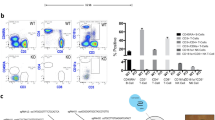Abstract.
Highly efficient retroviral-mediated gene transfer into hepatocytes in vivo has been previously reported in rats, but some reports described transient expression of the transgene that may be related to induction of an immune response against the transgene product. To devise a surgical approach to circumvent this drawback, two-thirds partial hepatectomy was performed in Wistar male rats to induce the hepatocyte division required to achieve retrovirus integration. Delivery of amphotrophic retroviral vectors (RVV) encoding Escherichia coli β-galactosidase was performed 24 h after partial hepatectomy. In a first group (n = 11), gene delivery was performed by peripheral injection of 2 ml retrovirus-containing medium. For the second group (n = 11), asanguineous perfusion of the regenerating liver after complete vascular exclusion was carried out with 20 ml viral solution. Liver biopsies were performed sequentially in each group. In the first group, β-galactosidase was expressed at day 7 in 7 ± 6.3% of hepatocytes and the labeled hepatocytes had disappeared in less than 4 weeks. Polymerase chain reaction experiments demonstrated the elimination of the transduced cells and the appearance of antibodies against β-galactosidase. Of the 11 rats in the second group, 8 were still able to express β-galactosidase more than 6 weeks after asanguineous perfusion with no detectable antibody response. Asanguineous perfusion of the regenerating liver with RVV after complete vascular exclusion enabled long-term expression in rats and avoided the immune response present after peripheral delivery in most animals. These results suggest that the immune reaction is secondary to viral infection of antigen presenting cells. Asanguineous perfusion could thus be a way to perform gene therapy for inherited liver diseases without immunosupressive therapy.
Similar content being viewed by others
Author information
Authors and Affiliations
Additional information
Electronic Publication
Rights and permissions
About this article
Cite this article
Podevin, G., Pichard, V., Durand, S. et al. In-vivo retroviral gene transfer to the liver is cancelled by an immune response against the corrected cells. Can it be avoided?. Ped Surgery Int 18, 595–599 (2002). https://doi.org/10.1007/s00383-002-0864-6
Accepted:
Issue Date:
DOI: https://doi.org/10.1007/s00383-002-0864-6




